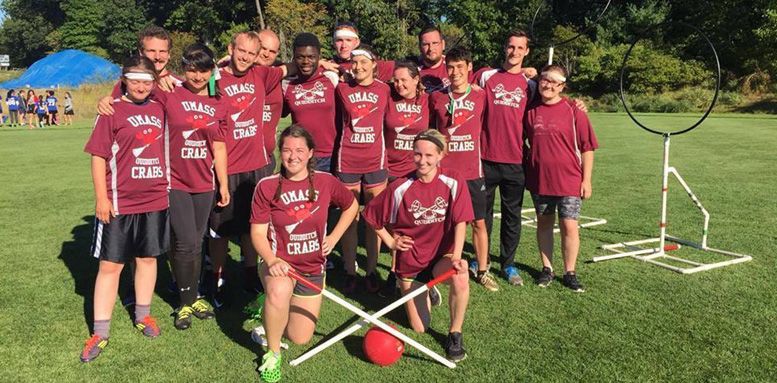By: Sandra Dias/TRT Reporter—
AMHERST—At big universities such as the University of Massachusetts Amherst (UMass Amherst), high-profile sports such as football and basketball get all the attention.
But another college sport—quidditch, the fantastical competitive sport from the Harry Potter novels and movies—is taking hold, albeit quietly. It has also become a haven of sorts for LGBTQ players—some of whom gained the courage to come out while on the team—in an environment where differences are embraced. Eager to bring that atmosphere of inclusion to young people, team leaders are launching a new camp this summer to teach children ages 6 through 14 the game of quidditch.
“The Quidditch team at UMass is incredibly [welcoming] and warm to people of all diversities,” said Annierose Klingbeil, a rising junior at UMass Amherst and president/captain of the UMass quidditch team. “We have many LGBTQ players on the team and everyone is a supportive ally.”
In the make-believe world of Harry Potter, quidditch is a competitive sport involving flying contestants, but in the real world, UMass Quidditch players use PVC pipes in place of flying broomsticks. The game is modeled after Harry Potter’s quidditch and Klingbeil describes it as a mixture of dodgeball, handball, tag, and rugby.
According to U.S. Quidditch, the game is played as follows: three chasers score goals worth 10 points each with a slightly deflated volleyball called the quaffle. They advance the ball down the field by running with it, passing it to teammates, or kicking it. Each team has a keeper who defends the goal hoops. Two beaters use dodge balls called bludgers to disrupt the flow of the game by “knocking out” other players.
Any player hit by a bludger is out of play until they touch their own goals. Each team also has a seeker who tries to catch the snitch. The snitch is a ball attached to the waistband of the snitch runner, a neutral athlete in a yellow uniform who uses any means to avoid capture. The snitch is worth 30 points and its capture ends the game. If the score is tied after the snitch catch, the game proceeds into overtime.
“I loved the Harry Potter books growing up and tried the game one day at an activity fair at UMass,” Klingbeil said. “I really liked the people there and I just kept going back. I’d never heard of it as a real sport before, but it is a lot of fun.”
According to Klingbeil, the sport attracts all kinds of players.
“There are people who just love Harry Potter and are not athletic at all and just want to play for the Harry Potter sake of it. But then there are athletes, as well,” she said. “It makes it really fun, but for the most part, we don’t take ourselves too seriously. Really, we are playing a sport adapted from fantasy, so the focus is mostly on having fun and laughing at ourselves and making friends.”
Klingbeil said a few people on the team have come out as gay or lesbian or define themselves as queer. She believes that the friendly, supportive atmosphere of the team has helped its young members more fully accept themselves.
“The community we have built together and the time we have spent having fun together has made it a comfortable environment,” she said.
The co-ed sport also helps people to step out of stereotypical gender roles perpetuated by mainstream society, according to Klingbeil. She said male teammates, for instance, have no problem wrestling with her or tackling her just because she identifies as female.
Klingbeil said the only rule related to gender is that there can be no more than four people who identify as the same gender out on the field for a particular team at one time; there is an exception made for college teams from same-sex institutions, however.
Klingbeil said the UMass Quidditch team plays many other teams with transgendered and gender non-conforming players.
“I think it opens it up for a lot more people to participate, not having a specific men’s and women’s team,” she said. “It’s easy to feel a part of this community as compared to other sports where that is not always the case.”
UMass Quidditch belongs to the Southern New England Conference and plays teams from many other places, including Wellesley College, University of Rhode Island, University of New Haven, Clark University, Smith College, Westfield State University, UMass/Lowell, and a community team from Providence, Rhode Island.
Klingbeil said that young people that did not have the support to come out in high school have been able to do so partly through the help of peers on the UMass Quidditch team. Supportive allies have helped their friends explore the meaning of their feelings and same-sex attractions and have referred them to resources such as the college’s Stonewall Center and counseling services.
“There are a couple of people on the UMass Quidditch team who are from the LGBT community,” Matthew McCudden, co-captain of the team, said. “The quidditch community as a whole is very open and accepting. It is a co-ed sport and we are very open to all gender identities and how people wish to express themselves. It’s a very inclusive community.”
“There are a lot of conversations happening on the team and introductions made to other people who have come out, so it helps people going through the process,” Klingbeil said.
Klingbeil, who is from Belmont, said even in a more progressive state such as Massachusetts, many queer-identified young people still lack the support of their parents, are teased or outright bulliessd in high schools, and are not offered any education about the LGBT community or helpful resources.
“Our team is a close-knit community that doesn’t want anyone to feel left out in any way, which is something that a lot of kids in high school feel,” she said. “We are a bit of a ragtag bunch who were not necessarily the popular kids in school. We come from pretty much all walks of life, from people who grew up playing sports to kids who never played anything and were bullied all through school. There are people of color on our team and students from abroad.”
The UMass quidditch team is running the summer quidditch program to introduce younger kids to the sport, but also to raise money for its players to travel to faraway conferences; Klingbeil said no one is turned away from the team for lack of funds. The camp will run from August 21-25 and is open to anyone ages 6-14. There is a day-long tournament on the final day that will be open to the public to watch.
“We would love to give children the opportunity to learn how to play this fun sport, which most have only ever pictured in the depths of their imagination,” Klingbeil said.
The team hopes to show children that in an era of highly competitive sports, there are other things to be learned from quidditch: notably, the importance of friendship and having fun.
For more information about UMass Quidditch, visit https://goo.gl/6wyHXt. To register for the summer program visit https://goo.gl/jrFQSE.
[This story was originally published on the TRT August 3, 2017 issue]







